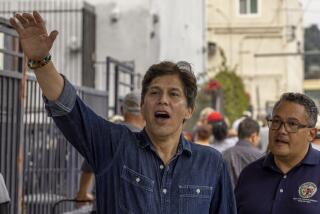New Chicago Mayor Snared by Controversy
- Share via
CHICAGO — Barely seven weeks after being appointed acting mayor, Eugene Sawyer has secured a place in Chicago’s rich and scandal scarred political history: He has become immersed in major controversy sooner than any of his 42 predecessors.
On Friday, Sawyer delayed a planned announcement that he would seek election as mayor in his own right amid a growing furor over a mysterious $30,000 payment he received a decade ago when he was an obscure city councilman.
“He is in major trouble,” said Paul Green, a political scientist and co-author of a recent book on Windy City mayors. “No (Chicago) mayor has ever had this much controversy surrounding his or her administration so early in the game.”
Tribune Raises Questions
Questions about the payment were raised by the Chicago Tribune just one week after Sawyer emerged from a deal-filled, raucous, night-long City Council meeting as successor to the late Mayor Harold Washington. The paper reported that Sawyer had received the payment from an attorney--now a Cook County circuit court judge--whose client wanted land in Sawyer’s ward rezoned for a shopping center.
Chicago council members have near-dictatorial control over zoning in their home wards.
Initially Sawyer, soft spoken and unaccustomed to intense public scrutiny, contended the money, almost twice his annual City Council salary at the time, was a fee he received for helping the lawyer, Fred Sudak, get financing for an Arizona land deal.
“Contrary to what has been reported in the press, it was not received for my support of zoning changes in the 6th Ward,” Sawyer said in a printed Dec. 16 statement released by his press office. At the time the acting mayor also said the amount was $30,000 and that the transaction took place in 1978 or 1979.
Revises Explanation
But on Thursday the mayor drastically, and inexplicably, revised his explanation, raising more questions that remain unanswered.
“It wasn’t an Arizona land deal,” Sawyer told reporters. He said the money was a fee for helping one of Sudak’s clients obtain bank financing for a new shopping center. “They couldn’t get loans and, as an alderman in a local community, I have every right to push and try to get business in the community where those businesses have difficulty in getting financing,” he said.
In 1976, according to the Chicago Tribune, Sawyer voted for an ordinance that changed the zoning on the property where the shopping center was eventually built, and later introduced another ordinance that allowed developers to build on alley rights of way on the property.
Won’t Discuss Payment
On Friday, Sawyer refused to discuss the payment or details of the transaction, referring reporters to Sudak. And Sudak referred them to his lawyer.
Sudak, a little-known judge until Sawyer’s surprise election as acting mayor, is also paying a price for the notoriety.
The Chicago Bar Assn. has withdrawn its endorsement for his reelection to the bench and the Illinois Attorney Registration and Disciplinary Commission is reportedly investigating his conduct as a lawyer.
“Mayor Sawyer’s only in trouble on one issue--the mysterious $30,000,” said scholar Green. “If it wasn’t for this issue he’d be going great guns. But this issue is enough to scuttle the ship.”
More to Read
Sign up for Essential California
The most important California stories and recommendations in your inbox every morning.
You may occasionally receive promotional content from the Los Angeles Times.













